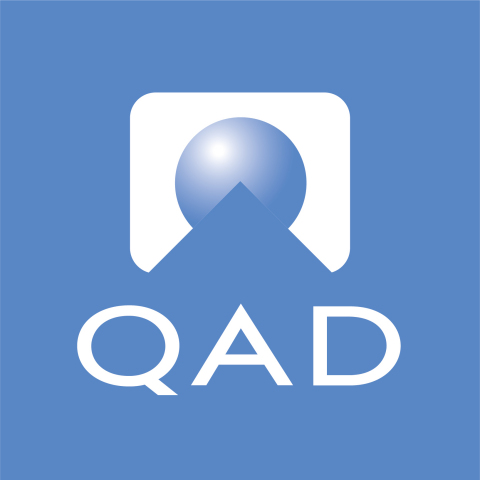QAD Partners with JK Tech to Deliver Global Consulting and Implementation Services
QAD Partners with JK Tech to Deliver Global Consulting and Implementation Services
SANTA BARBARA, Calif.--(BUSINESS WIRE)--QAD Inc. (Nasdaq: QADA) (Nasdaq: QADB), a leading provider of next-generation manufacturing and supply chain solutions in the cloud, today announced it has signed a system integrator agreement with JK Tech. JK Tech is an IT consulting company offering customized software development and IT services. Under the terms of the partnership, JK Tech will implement the QAD Adaptive Applications portfolio of solutions including QAD Adaptive ERP.
"JK Tech has deep knowledge and expertise in QAD, which should prove to be extremely valuable for our current and future customers," said QAD Senior Vice President, Consulting and Transformation Services Robin Riordan. "This partnership aligns with our strategic plan of growing our partner ecosystem. JK Tech's technology and business expertise and experience working with manufacturing companies will benefit our customers as they navigate a business climate being disrupted by a wide range of factors."
"JK Tech is poised to drive the next wave of cloud-based enterprise solutions to enable new levels of efficiencies in business operations," said JK Tech President and CEO Aloke Paskar. "We look forward to working closely with QAD and integrating our industry expertise with QAD's comprehensive portfolio of agile, cloud-based ERP solutions to digitally transform our customers together."
QAD partners expand the QAD ecosystem and strengthen its strategic position in the industries that it serves. QAD and its partners continuously evolve, broadening QAD's expertise and footprint to meet the diverse needs of customers around the world. The QAD Global Partner Network includes over 100 partners including technology, software, channel and consulting partners.
About QAD – Enabling the Adaptive Manufacturing Enterprise
QAD Inc. is a leading provider of next-generation manufacturing and supply chain solutions in the cloud. Global manufacturers face ever-increasing disruption caused by technology-driven innovation and changing consumer preferences. In order to survive and thrive, manufacturers must be able to innovate and change business models at unprecedented rates of speed. QAD calls these companies Adaptive Manufacturing Enterprises. QAD solutions help customers in the automotive, life sciences, consumer products, food and beverage, high tech and industrial manufacturing industries rapidly adapt to change and innovate for competitive advantage.
Founded in 1979 and headquartered in Santa Barbara, California, QAD has 30 offices globally. Over 2,000 manufacturing companies have deployed QAD solutions, including enterprise resource planning (ERP), digital supply chain planning (DSCP), global trade and transportation execution (GTTE), quality management system (QMS) and strategic sourcing and supplier management, to become an Adaptive Manufacturing Enterprise. To learn more, visit www.qad.com or call +1 805-566-6100. Find us on Twitter, LinkedIn, Facebook, Instagram and Pinterest.
"QAD" is a registered trademark of QAD Inc. All other products or company names herein may be trademarks of their respective owners.
About JK Tech
Founded in 1994, JK Tech is a leading next-generation Digital and IT services company committed to a superior experience through digital transformation. We combine technology expertise, value-driven services, and business intelligence, ensuring continuous success for clients. With our "customer delight" based approach, we simplify, strengthen and transform the businesses that are aligned with next-generation technology demands. Our strategic technology-backed solutions are designed to equip your business with the competitive edge.
JK Tech is focused on offering solutions to Automotive, Dairy, CPG, Insurance, Healthcare, Retail, Logistics, Manufacturing verticals. JK Tech provides functional consulting, implementation and support services for QAD customers globally and offers multiple benefits to clients through our center of excellence.
Note to Investors: This press release contains certain forward-looking statements made under the "safe harbor" provisions of the Private Securities Litigation Reform Act of 1995, including, but not limited to, statements regarding projections of revenue, income and loss, capital expenditures, plans and objectives of management regarding the company's business, future economic performance or any of the assumptions underlying or relating to any of the foregoing. Forward-looking statements are based on the company's current expectations. Words such as "expects," "believes," "anticipates," "could," "will likely result," "estimates," "intends," "may," "projects," "should," "would," "might," "plan" and variations of these words and similar expressions are intended to identify these forward-looking statements. A number of risks and uncertainties could cause actual results to differ materially from those in the forward-looking statements. These risks include, but are not limited to: risks associated with the COVID-19 (novel coronavirus) pandemic or other catastrophic events that may harm our business; adverse economic, market or geo-political conditions that may disrupt our business; our cloud service offerings, such as defects and disruptions in our services, our ability to properly manage our cloud service offerings, our reliance on third-party hosting and other service providers, and our exposure to liability and loss from security breaches; demand for the company's products, including cloud service, licenses, services and maintenance; pressure to make concessions on our pricing and changes in our pricing models; protection of our intellectual property; dependence on third-party suppliers and other third-party relationships, such as sales, services and marketing channels; changes in our revenue, earnings, operating expenses and margins; the reliability of our financial forecasts and estimates of the costs and benefits of transactions; the ability to leverage changes in technology; defects in our software products and services; third-party opinions about the company; competition in our industry; the ability to recruit and retain key personnel; delays in sales; timely and effective integration of newly acquired businesses; economic conditions in our vertical markets and worldwide; exchange rate fluctuations; and the global political environment. For a more detailed description of the risk factors associated with the company and factors that may affect our forward-looking statements, please refer to the company's latest Annual Report on Form 10-K and, in particular, the section entitled "Risk Factors" therein, and in other periodic reports the company files with the Securities and Exchange Commission thereafter. Management does not undertake to update these forward-looking statements except as required by law.
Contacts
QAD Inc.
Scott Matulis
Public Relations
818-451-8918
publicrelations@qad.com
or
Evan Quinn
Analyst Relations
617-869-7335
industryanalyst@qad.com
